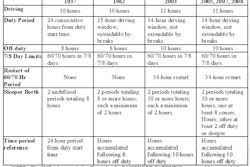
Starting in 2020, international diesel standards for maritime carriers will tighten dramatically, forcing them to use a diesel with 85 percent less sulfur than current levels allow. Though the regs don’t impact trucking fuel, which uses ultra-low-sulfur diesel (even lower than the new maritime standards), the tighter maritime regulations likely will alter the global diesel market and could put upward pressure on diesel prices as soon as the fourth quarter of this year.
What’s more, the regs could spur maritime carriers, especially those in heavy shipping lanes from China, to shorten water-bound hauls, meaning freight that might have been bound for the East Coast through the Panama Canal might now wind up at West Coast ports.
Mark Montague, an analyst for DAT Solutions, says that may be the bigger impact for the U.S. trucking industry, rather than higher diesel prices. He says the issue could press diesel prices up 5 or 10 cents a gallon, but nothing that couldn’t “be offset by market conditions,” especially since gasoline and diesel prices have been slowly declining throughout most of the year. “It’s really unclear, in the big picture, how this issue fits in,” he said.
Though there’s been concern regarding diesel supply and pricing because of the maritime changes, the Department of Energy’s Energy Information Administration hasn’t seemed concerned. In its fuel price outlooks, the agency has downplayed the potential impacts, noting that refiners will simply shift their operations to produce lower-sulfur diesel for maritime shippers.

Montague, however, says refiners likely won’t be ready to make the switch in time, which could stress the diesel market temporarily, likely starting later this year. “We could start to see some disruption in the fourth quarter as they start to change the refinery mix and shutdown refineries for the change-over,” he said.
Chris Lee, vice president of marketing for Bridge City, Texas-based ProMiles, says he’s “pretty sure the refineries around here are through with their turnarounds to significantly boost low-sulfur [diesel] production.”
Though he doesn’t foresee a need for suppliers to hike diesel prices, on-highway diesel prices could climb given natural volatility of diesel prices.










